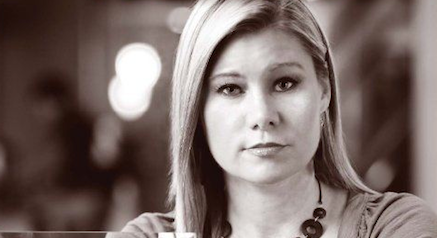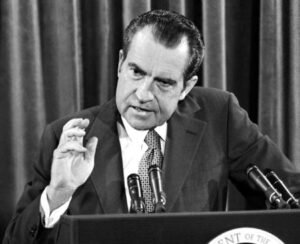In 2009 Nikki Goeser’s husband, Ben, was murdered in front of her and dozens of other people by a man whom she didn’t know had been stalking her. The entire chilling story is told in her 2019 book, “Stalked and Defenseless: How Gun Control Helped My Stalker Murder My Husband in Front of Me.”
Ben’s murderer was sentenced to 23 years in prison, but because he has earned enough “good behavior credits,” he is slated for early release, sometime in 2028. What does his “good behavior” entail? Since his incarceration, this disturbed individual has continued to stalk Nikki from prison, sending nine letters to her, relentlessly declaring his undying love. Nikki didn’t know about the letters until 2019, when she discovered that they had been redirected to her former attorney’s office. Motivated by the fear of what this madman could do to her once released from prison, Nikki began to diligently fight to change laws in her state that would prevent him from continuing to terrorize her, even from behind bars. In fact, thanks to her outspokenness and persistence, the murderer has now been formally charged with “stalking by mail.” If convicted, he faces time in federal prison and would not be eligible for parole, and that early release could be erased.
Nikki first told me about those letters, which she had only then recently discovered, when we met at the 2020 SHOT Show. She now works for the Crime Prevention Research Center, and was embarking on another mission at that time, to prevent so-called “Red Flag” laws from passing. She was writing editorials for placement in national media. These laws, sometimes called Emergency Risk Protection Orders, which have until recently have been passed by individual states (President Biden has included national Red Flag Laws in his proposed gun control measures), provide for no due process for the individual whose firearms have been summarily confiscated, usually after someone known to the individual files a report to a law enforcement agency suggesting that person is a danger to himself or others. The official statement regarding these orders can be found on the NRA-ILA site, but in short states:
“The NRA strongly opposed these laws because they do not protect due process rights. We will continue to oppose confiscation schemes such as these.
In addition, the NRA opposes any effort to create a federal ERPO law, in which federal agents would be tasked with seizing firearms after a hearing in federal court. As states consider ERPO laws, the NRA will continue to push for the inclusion of strong due process protections.
The NRA believes that any effort should be structured to fully protect the Second Amendment rights of law-abiding citizens while preventing truly dangerous individuals from accessing firearms.”
In my state, Maryland, where these laws exist, I have heard stories where authorities simply confiscate one’s guns, toss them into a barrel along with a lot of other guns that were confiscated in a similar manner, effectively requiring the accused to prove that he or she is not guilty. They may or may not ever see their firearms again. And forget about whatever pristine or collector’s condition they may have been in. These laws are polar opposite of “innocent until proven guilty,” and entirely anathema to our American system of justice.
Nikki recalls that in her sadness in the months after her husband’s murder—a natural part of the grieving process—her family worried for her. They knew she owned a gun. She reels at the thought of what might have happened to her gun rights if there were such a law in her state of Tennessee. She might have been left essentially defenseless had someone reported her as a danger to herself. And she wonders now how she would protect herself from the man who has not stopped terrorizing her.
Today, a Red Flag law is pending in her state’s legislature. But this has only emboldened Nikki’s resolve. In fact, she has upped her presence with lawmakers, testifying in front of Congress in late April, speaking for the millions of law-abiding gun owners who don’t deserve to be demonized through a simple lack of due process.
She has become a warrior for justice.
Read Nikki Goeser’s testimony below:
Thank you, Mr. Chairman and members of the Committee. I am here speaking as a victim of a violent crime. I’d like to share some insight on how red flag laws can have devastating, unintended consequences for many Americans.
In 2009, my husband Ben was shot seven times and killed in front of me by a man who until that night, I didn’t know was stalking me. We were in a gun-free zone.
Realizing that night that I was being stalked, but not knowing this man was dangerous, I asked management to please remove the man from the establishment. There was no confrontation between us and no words were exchanged with my stalker. When management approached and asked him to leave, he pulled a .45 handgun, came up behind my husband, shot him in the head, he then stood over Ben and continued to fire six more rounds into him. I witnessed this in horror along with 50 other people. My stalker was in complete control. He was the only one with a gun. Because of the law, I had to leave my legal, permitted firearm that I normally carried for self-defense, locked inside my vehicle that night. I obeyed that gun control law, my stalker did not.
When police searched his vehicle at the crime scene, they found two more guns, ammunition, a baseball bat, binoculars, gloves, rope and a knife. Ben’s murderer has been sending me twisted love letters for years from prison, to traumatize and terrorize me even further. Much to my dismay, he is set to be released early for “good behavior” in just 7 more years. I have real fears about what he will do once released. This horrifying experience will be with me for the rest of my life.
The days, months and years that followed were very difficult for me. Depression, nightmares, grief, trauma, loss and concern for my safety, were all things I dealt with and had to work through. Every emotion I have experienced is a normal human reaction to something this horrific. Put yourself in my shoes, how would you feel?
I remember thinking during this time that if I just happened to pass away in my sleep, I would be okay with that, because I didn’t know how I could face another day. I was never suicidal, but you can see where someone may misinterpret that. If red flag laws had been in place in my state, even those with the best intentions could have an exaggerated concern and assume they were ac=ng in my best interest, by having my guns taken from me. It would be devastating for a victim like me, to be unable to protect myself after this stalker violated me in such a horrific and life altering way. If he comes for me someday, my gun may be the only thing that could save my life.
Red flag laws can have a real chilling effect and can cause victims to fear losing their rights if they seek help by talking with friends, family or psychologists. Talking through these emotions is very important for mental health, and not doing so can compound the problem. Do we really want to live in a world where victims fear getting help for fear of losing their rights? Rights should not be taken from people without due process first. Certainly, if we are talking about mental health, then mental health experts should absolutely be involved in that due process.
The person who is subject to having their firearms taken due to red flag laws is solely responsible for getting them back. The burden of hiring an attorney and paying thousands of dollars for representation would be on me. Who knows how long it could take in court and how much money it would cost to regain my safety? The process is unfair and burdensome.
It’s not only victims who can be impacted by red flag laws. Anyone who has dealt with traumatic events could be affected and choose not to seek help. Police, first responders, nurses, doctors, military etc …
Research varies, there are indications that red flag laws range from having no significant effect on homicides and suicides to an increase.1
Academics as a whole are also very skeptical of the benefits of Red Flag Laws. In the largest survey of academics who have published empirical work on guns, neither criminologists, economists, nor public health researchers believed Red Flag laws effectively reduced murder rates or mass public shootings.2
There are already laws that, had they actually been enforced, could have changed the outcome with my stalker. But no one enforced those existing laws.
I learned during the murder trial that there were signs my stalker was a danger to others years before we ever met him. His coworkers, friends and family knew of these signs. I don’t know if those in my stalker’s life ever reported him to police, but if they did, just as with Nicholas Cruz, who did the Parkland attack, they didn’t act.
Ben’s murderer threatened to kill his own secretary at his job in Florida. My stalker’s father said at trial that it “scared the stew” out of her. He fired a shotgun at innocent hunters near his property out of anger. At this point, he should have been arrested, charged with a crime and convicted. That alone would have prohibited him from possessing and purchasing firearms. But for some reason, that never happened. These are just a few examples of what he did before he became a murderer. He had no criminal record and no mental illness on record, but he certainly should have. How did he fall through the cracks?
The people in his life could have “Baker Acted” him, where he would have been put on a 72-hour hold, and a mental evaluation would have been done.3 He would have then gone before a judge, evidence would be presented, and a Judge has a whole range of options including giving the person a chance with voluntary out-patient treatment, removal of guns and involuntary commitment. All states already have similar options to the Baker Act. It is an existing option that includes due process, mental health experts and if you cannot afford an attorney, one will be provided for you.
If someone is indeed a real danger to themself or others, simply taking away their guns is not a serious response. Red flag laws are overwhelmingly used because of fears of suicide. There are other ways to commit suicide that have similar high success rates.4
In conclusion, I believe the focus should be on mental health services and facilities in this country. The focus should also be on education for the public, along with training for law enforcement, judges and prosecutors regarding existing laws such as the Baker Act. There should also be a coordinated effort to enforce the Baker Act and related laws. And please don’t ever forget compassion for good people going through a difficult time.
Thank you.
1 John R. Lo7, Jr. and Carlisle E. Moody, “Do Red Flag Laws Save Lives?” Social Science Research Network, November 12, 2019 (h7ps://papers.ssrn.com/sol3/papers.cfm?abstract_id=3492120) and John R. Lo7, Jr. and Carlisle E. Moody, “Do Red Flag Laws Reduce Crime?,” Social Science Research Network, January 27, 2019 (h7ps://papers.ssrn.com/sol3/papers.cfm? abstract_id=3316573).
2 Arthur Berg, John Lo7, Gary Mauser, “Expert Views on Gun Laws,” Regulation, Winter 2019-2020, pp. 40-47 (h7ps://papers.ssrn.com/sol3/papers.cfm?abstract_id=3507975)
3 h7p://www.leg.state.fl.us/statutes/index.cfm? App_mode Display Statute &URL=0300-0399/0394/0394.html
An Excel file with the similar laws from all fifty states is available here h7ps:// crimeresearch.org/wp-content/uploads/2021/04/Involuntary-Commitment-Laws_revised.xlsx
4 CE Rhyne, DI Templer, LG Brown and NB Peters, “Dimensions of Suicide: Perceptions of Lethality, Time and Agony”, in Suicide and Life-Threatening Behavior, Vol. 25(3), 1995 (h7ps:// pubmed.ncbi.nlm.nih.gov/8553417/).



















